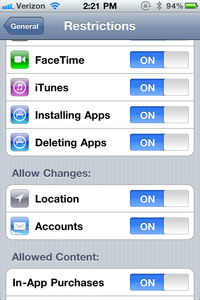 Almost every week we here at Vector Unit get a support email like this one:
Almost every week we here at Vector Unit get a support email like this one:
I just received my credit card statement and realized that my child has made these purchases in your free game Beach Buggy Blitz. These purchases were made without my permission, and I don't understand how your application can allow this. I would respectfully request a refund on them.
Many parents are not aware that it is possible to make purchases within the "free" games they download for their kids. Furthermore, they apparently don't realize they can protect themselves against this kind of unwanted activity.
In the interests of human decency (and hopefully as a way of cutting down on a few support emails) we'd like to share some thoughts on why these purchases occur...and what you as a parent can do to prevent them.
Ain't No Such Thing as a Free Lunch
First of all, it's important to realize why these purchases even exist. Google Play and the iOS AppStore are crowded with hundreds of games that are free to download and play. Obviously these are very tempting targets for most parents, since ... well, they're free, right?
There's only one problem: They're not really free.
See, every so-called "free" game in the app stores has some built-in mechanism for making money after you've installed it. There's a good reason for this: game companies are businesses, and they exist to make money so they can continue to develop new games. It just so happens that by attracting players by making games free, and then charging players in game for stuff later, developers can often make more money than if they just charge once for the game up front.
There are 3 main ways developers make money in a free game. (Some paid games employ these as well):
- Show ads. These can be banner ads or full-length video advertisements for products such as apps, toys, or fast food restaurants.
- Present players with "offer walls" which prompt them to install yet more apps in exchange for, say, gems or coins in the game.
- Offer a selection of "In App Purchases" or IAP. These often take the form of bundles of in-game currency like coins or gems that can be spent within the game to unlock more content. Prices on such IAP can range from $1 or $2 all the way up to $99 or higher.
It's the third option -- IAP -- that concern most parents. (Although honestly you should be just as aware and concerned with #1 and #2). Parents are sometimes shocked to discover that these IAP are so easily accessible within the games. Indeed, many games repeatedly push the player towards the store where IAP can be purchased. Some games are particularly aggressive about "monetizing their players" while others (like our game Beach Buggy Blitz) take a relatively hands-off approach.
But make no mistake -- if you download a free game for your kids, it almost certaintly will contain IAP. It will try to encourage your child to click on those IAP buttons. And it will try to make the purchase as frictionless as possible. And once your kid starts clicking, there's nothing to stop them from clicking again, and again, and again....
So what can you do to protect yourself against a nasty surprise on your credit card statement?
Password Protect Your Account
This is probably the most basic way to protect yourself. Every app store has an option in the settings to require a password before somebody can purchase anything on the credit cards associated with the account.
For Android devices like the Galaxy S4 or Nexus 7:
- Open the Play app (aka Google Play) on your device
- Click the 3 dot menu button in the corner of the screen
- Select Settings
- Scroll down the list to the "User Controls" setting and turn on the item that says "Password: Use password to restrict purchases"
For iOS devices like the iPad or iPhone:
- Open the Settings app on your device
- Click on "General"
- Click on "Restrictions"
- Click "Enable Restrictions" and set a password
- Once restrictions are enabled, you can turn on password protection for lots of different behaviors on your device. You can restrict all of iTunes, or just In-App Purchases, or even exclude particular ratings like "mature content".
- You may also wish to change the re-lock time limit from the default 15 minutes to "immediate".
For other devices like Kindle and BlackBerry 10, please see the support pages for those particular devices.
Once you have a password protection set up, any time your child tries to buy something, the service will bring up a dialog requesting a password. Then your child can ask you for permission to make the purchase, and you can chose to allow it or not.
WARNING: On those occasions when you agree to unlock the device for your child, be aware that on some systems (like iOS), the device will stay unlocked for a period of time and allow subsequent purchases without re-entering the password. On most systems you can change this time or even eliminate it.
Use Gift Cards
If you have older kids and you want them to have a budget or allowance for games, gift cards can provide another option.
You can use your Google Play or iTunes account without a credit card -- just go into your profile settings and remove the credit card on record. Then if you want, you can buy $10, $25 or other gift cards and refill your account to some set limit. As long as your kids don't exceed that limit, they can make whatever purchases they want.
Get gift cards for Google Play here and for iTunes here.
Play in Airplane Mode
Switching your device to Airplane Mode disables internet connectivity and thereby diables unwanted downloads and purchases. This can work well as a quick fix for smaller kids, but don't be surprised if your three year old already knows how to turn the WiFi back on.
Educate Yourself and Your Kids
If you've read this far, you may have already realized the single most important fact about giving your kid games to play on your phone or tablet -- there is no such thing as a free game. Unless you've played the game yourself and have verified otherwise, you should assume that every free game on the market has IAP in it. Just knowing that is half the battle.
Spend a little time to read the game descriptions and user reviews before you download them. Maybe even search the web for a few reviews on blogs and websites. Most responsible developers will tell you in the game description if the game contains IAP. On the iTunes store you can see a list of the top 5 most popular IAP if the game has IAP. On Google Play it's harder to know without actually downloading the game and trying it.
It would be nice if all app stores had a little badge that alerted you whether a game has IAP or not, but we're not there yet.
Random thought: Of course there are other benefits to knowing more about the games your kids are playing. Not all games are age-appropriate for all kids, regardless of what they're rated. Plus, let's face it -- some games are good and some games are lousy. Just as with books or movies, you probably would rather your kids play high quality games. Right?
The other half of the battle is explaining to your kids how these devices work, and that clicking on buttons in the game can cost you real money. Just like you wouldn't allow your child to take money out of your purse without your permission, explain to your child that they are not allowed to make purchases or download games or stream movies or do anything on your tablet or phone without your permission.
Although even if you do explain all this, it's probably still a good precaution to require a password. Not only will this act as a backup for your kids, it will protect you if your device is ever lost or stolen.
Developer Responsibilities
Although I firmly believe that the responsibility of monitoring and protecting children's digital activity ultimately lies with their parents, game developers and publishers can and should take steps to aid and assist parents trying to make educated choices.
First and foremost, developers should always clearly state in the game description whether a game contains IAP.
Second, when parents do realize that there have been charges on the account they didn't expect, and request a refund, developers should give it to them. No hassles, no hoops -- just give it to them.
At Vector Unit, we already take these precautions with our games. But maybe we could do more. If you have ideas or thoughts, please comment below or send your thoughts to info@vectorunit.com. We'd love to hear them!

